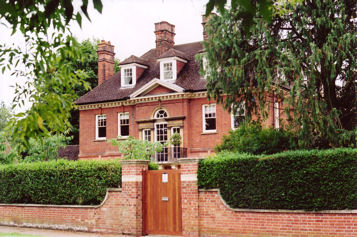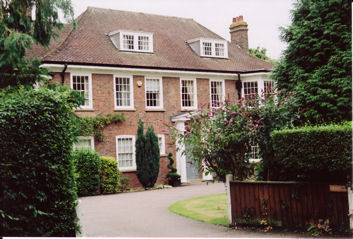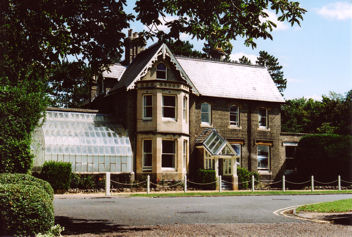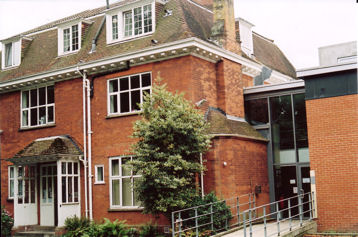
| Trumpington Local History Group Developing Chaucer Road and Latham Road |
| Copyright © Trumpington Local History Group, 2014. Updated 3 July 2014. |
Peter Dawson, August 2008
This is the second part of a history of the Chaucer Road and Latham
Road area of Trumpington, partly based on information in Rus In Urbe.
Chaucer Road and Latham Road: the History of Two Rural Roads in
Cambridge. For an introduction, see Chaucer Road and Latham Road
Area.
This is the second part of a history of the Chaucer Road and Latham
Road area of Trumpington, partly based on information in Rus In Urbe.
Chaucer Road and Latham Road: the History of Two Rural Roads in
Cambridge. For an introduction, see Chaucer Road and Latham Road
Area.
The enclosure demarcation of the early 19th
century provided the basis for housing plots
sold by the Pemberton family from 1878,
with 99-year leases. First Chaucer Road and
then Latham Road were laid out in a
deliberate plan. The roads remained
unadopted and were gated at the
Trumpington Road end until the 1930s.
Colleges had traditionally required their
Fellows to remain unmarried, until they were
forced from within to rescind the statutes
which demanded celibacy. First Gonville &
Caius College, then Trinity Hall (persuaded
by Henry Fawcett and his friend and
biographer Leslie Stephen) gave way in 1860.
A Royal Commission freed all Fellows to
marry from 1882 and many of them then
sought suitable locations on which to build
houses of a quality and size befitting their
status.
Although unmarried, the first new resident
was Reverend Henry Latham of Trinity Hall.
His house, Southacre, was built in 1880 in
the grounds of the former nursery, at the east
end of the road to which he gave his name.
Chaucer Road was named after Geoffrey
Chaucer, because of the reference in the
Reeve's Tale to the mill in Trumpington. The
side roads, Chaucer Close, Southacre Drive
and Southacre Close, were added in 1989.
From 1890 to 1914, 17 substantial individual
properties were built by tenants, mostly
academics, in the two roads. A further three
properties were built in the 1920s and 11 in
the 1930s. All of them were in accordance
with the Pemberton family's vision and
intended character. In 1940, the Pembertons
sold freehold reversions for most of the
houses to the University, for a mere £29,000.
The houses and Masters' Lodges, many
grand enough to accommodate a full
complement of domestic staff, with coach
houses and coachman's cottages, were built,
it seems, according to the whims of the
tenants. They were in a diverse range of
styles, from splendid Victorian Mock Tudor
and neo-Georgian to 1930s modern concrete
carbuncular.
As well as businessmen and many eminent
academics, residents included student princes.
In 1888, the young Indian Prince Ranji
(Ranjitsinhji Vibhaji, maharaja jam sahib of
Navanagar), a renowned batsman who later
played for England, lived at 1 Chaucer Road.
Fellow undergraduates, unable to pronounce
his full name, referred to him as 'Smith'. In
1919-20, two British princes lived at
Southacre House: Prince Albert, who became
George VI, and Prince Henry, who became
the Duke of Gloucester.
During the Second World War, air-raid
shelters were built in many of the gardens
and numerous evacuees were taken into the
homes. On one occasion, incendiary bombs
fell nearby after being jettisoned from
German planes.
The entrance to Chaucer Road was made
safe from enemy tanks by concrete blocks
and a cart. This proved unpopular with
drivers who were unfamiliar with the area,
with a number of cars and lorries being
damaged. From 1940-45, 15 Chaucer Road
housed the Cambridge University Air
Squadron. In 1948, the squadron moved to 2
Chaucer Road, where it is still based. During
the war, drill parades were held in the road,
with little traffic in those days. 6 Chaucer
Road was a motor licence office.
century provided the basis for housing plots
sold by the Pemberton family from 1878,
with 99-year leases. First Chaucer Road and
then Latham Road were laid out in a
deliberate plan. The roads remained
unadopted and were gated at the
Trumpington Road end until the 1930s.
Colleges had traditionally required their
Fellows to remain unmarried, until they were
forced from within to rescind the statutes
which demanded celibacy. First Gonville &
Caius College, then Trinity Hall (persuaded
by Henry Fawcett and his friend and
biographer Leslie Stephen) gave way in 1860.
A Royal Commission freed all Fellows to
marry from 1882 and many of them then
sought suitable locations on which to build
houses of a quality and size befitting their
status.
Although unmarried, the first new resident
was Reverend Henry Latham of Trinity Hall.
His house, Southacre, was built in 1880 in
the grounds of the former nursery, at the east
end of the road to which he gave his name.
Chaucer Road was named after Geoffrey
Chaucer, because of the reference in the
Reeve's Tale to the mill in Trumpington. The
side roads, Chaucer Close, Southacre Drive
and Southacre Close, were added in 1989.
From 1890 to 1914, 17 substantial individual
properties were built by tenants, mostly
academics, in the two roads. A further three
properties were built in the 1920s and 11 in
the 1930s. All of them were in accordance
with the Pemberton family's vision and
intended character. In 1940, the Pembertons
sold freehold reversions for most of the
houses to the University, for a mere £29,000.
The houses and Masters' Lodges, many
grand enough to accommodate a full
complement of domestic staff, with coach
houses and coachman's cottages, were built,
it seems, according to the whims of the
tenants. They were in a diverse range of
styles, from splendid Victorian Mock Tudor
and neo-Georgian to 1930s modern concrete
carbuncular.
As well as businessmen and many eminent
academics, residents included student princes.
In 1888, the young Indian Prince Ranji
(Ranjitsinhji Vibhaji, maharaja jam sahib of
Navanagar), a renowned batsman who later
played for England, lived at 1 Chaucer Road.
Fellow undergraduates, unable to pronounce
his full name, referred to him as 'Smith'. In
1919-20, two British princes lived at
Southacre House: Prince Albert, who became
George VI, and Prince Henry, who became
the Duke of Gloucester.
During the Second World War, air-raid
shelters were built in many of the gardens
and numerous evacuees were taken into the
homes. On one occasion, incendiary bombs
fell nearby after being jettisoned from
German planes.
The entrance to Chaucer Road was made
safe from enemy tanks by concrete blocks
and a cart. This proved unpopular with
drivers who were unfamiliar with the area,
with a number of cars and lorries being
damaged. From 1940-45, 15 Chaucer Road
housed the Cambridge University Air
Squadron. In 1948, the squadron moved to 2
Chaucer Road, where it is still based. During
the war, drill parades were held in the road,
with little traffic in those days. 6 Chaucer
Road was a motor licence office.
| Continue with the final part of Peter Dawson's history of the Chaucer Road and Latham Road area of Trumpington. |
| 9 Chaucer Road (Edwinstowe), built in the 1890s. Photo: Andrew Roberts, August 2008. |


| 5 Latham Road, built in the 1920s. Photo: Andrew Roberts, August 2008. |

| 15 Chaucer Road (top) and 2 Chaucer Road (bottom), the locations of the Cambridge University Air Squadron. Photographs: Andrew Roberts, July and August 2008. |


| The central part of Chaucer Road. Photo: Andrew Roberts, July 2008. |

| Extract from the Inland Revenue Land Value map for Trumpington, 1910-11, reproduced by permission of Cambridgeshire Archives, file 470/047, sheet XLVII.10. |